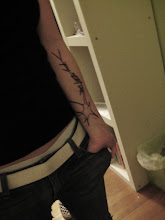Things are tentative, and it's been a sad year. Or at least that's what the calendar says. Where did all that time go, mapping out the future, darting around the present: shifting, worrying, letting things go. Letting days turn to days, as if days were just days and nothing more.--
Things that scare me:
(at the moment,) myself
(and as always,) the uncertainty of the future. Not having something to do with my hands
(and at the moment,)
, or any of my limbs, now that I think about it. Not having prepared adequately for the present, at least not this present, one that, at this point, is largely a museum (shockingly undusty) anyway. Leftovers from another lifetime. Things I've lost, resurfacing in daydreams.
oh, shit.
The things lost, not even countable. Not quantifiable, cannot be communicated. A whole life.
What I want: to be someone who is comfortable having everything.
Because I know I can have it, if I want it
Instead, what I am: someone who is comfortable only having nothing.
and I have it, because i want it.
I can't be so surprised.
How can you expect to build something when you only know self-destruction?
How can you build a home when all you know how to do is leave?
And who will you allow to be there when it finally gets hard, when you're only the shadow of a persona?
But just because it's not surprising, that doesn't mean it isn't sad.
I've never really just
listened
to someone cry. I've never just received someone's feelings. I don't know if I've given them in a way that's real.
Always the same: rationality, logistics. F e e l b e t t e r s o o n feelbettersooner.
These things are easy, yeah, everyone loves easy things. But these things aren't honest.
My life's been simple before, yeah, everyone loves a simple life. But this life hasn't been honest. This life hasn't been intimate. This body has been dependable, but the person who lives in it hasn't. I don't want to feel fine, because things aren't fine. It's as simple as that. Alone now, I answer only to myself. This can go one of two ways:
1) The way it always goes
2) The way it's going to go this time
It's time, finally, to grow up. What better time than the present. What better time to do something hard than when things are already so hard. Why bother to go easy on myself, when, all this time, life's been going so easy on me, and here I've been, just along for the ride.
But this is not a ride. This is real. No longer a game of winning or losing. This is decisions. These are ramifications. What you do is consequential. WHAT YOU DO IS CONSEQUENTIAL. What you do is consequential and this life is yours and what you do is yours and who you love is yours not to own but to care for and if you don't own up to these things, then these things will disappear from you, life will continue to happen to you, you will live, or you won't, but most likely you will live, you will live even if you hate it, and you will live because if you don't, then these grains, all these grains that were once so individually small, they will sift and switch and slip through your fingers and will never slip back, they will never un-fall, because
gravity
still
exists
, and suddenly - so suddenly - there is nothing in your hands.
--
I miss the future, the infinite possibilities, and I miss believing that things are good and that i am good and that it was so simple to live int he present tense, even though things are never really simple at all,
except for re-attaching laptop keys or taking out the recycling.
And the tragedy of growing up seems to be that growing up is only a tragedy.
And the truth is that the truth is maddening.
And in the tallest, widest windows - windows so large that they are only the dark - I catch glimpses of ghosts. But, no, it's only the light off the computer casting itself onto me in a reflection.
Just me, and I didn't want to lie anymore, so I told the truth.
And the truth was maddening.
Because I forgot - or i didn't consider - that it's not about the lies we don't tell, but about the things we do or don't do so that no one has to build their reality around them.
